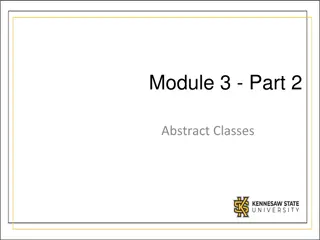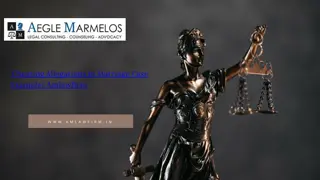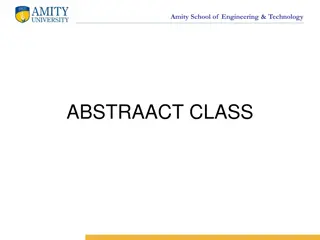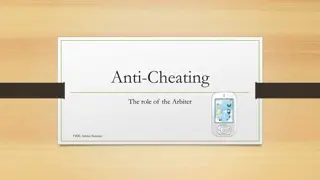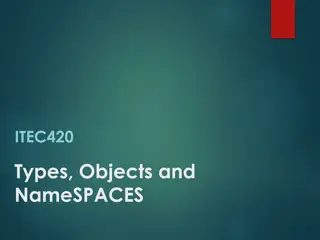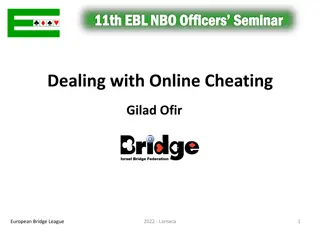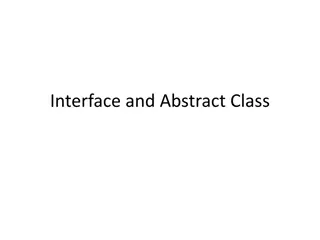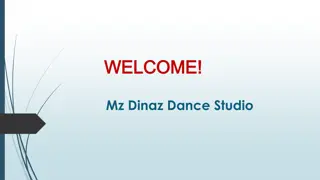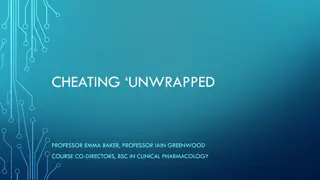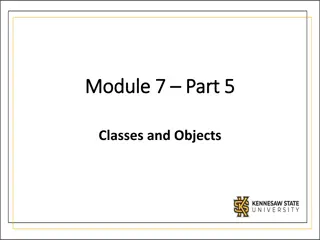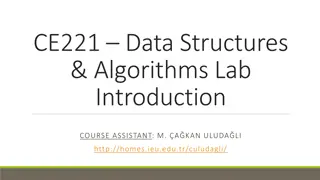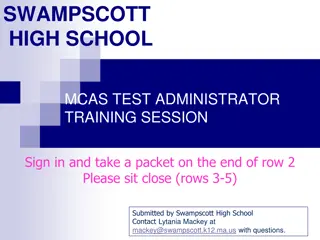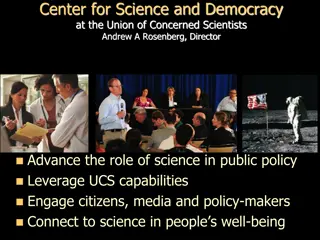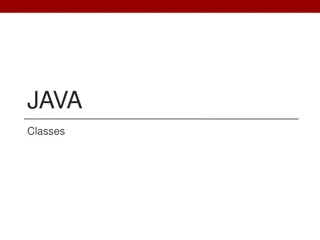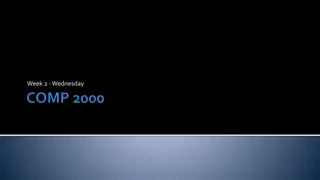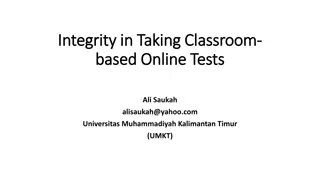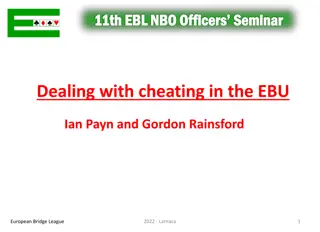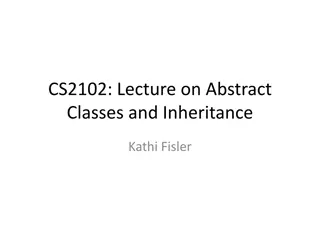Understanding Cheating in Online Classes: How Concerned Should We Be?
Growth in online classes has raised concerns about cheating. Research shows a disconnect between students and faculty perceptions of cheating rates. Factors driving cheating include pressure for better grades, normalized attitudes, and changing cultural norms. Certain student demographics, such as traditional aged males and business majors, tend to cheat more. Online platforms present challenges in detecting and preventing cheating due to easier access to resources.
Uploaded on Sep 21, 2024 | 0 Views
Download Presentation

Please find below an Image/Link to download the presentation.
The content on the website is provided AS IS for your information and personal use only. It may not be sold, licensed, or shared on other websites without obtaining consent from the author. Download presentation by click this link. If you encounter any issues during the download, it is possible that the publisher has removed the file from their server.
E N D
Presentation Transcript
Cheating in Online Classes: How Concerned Should We Be? Jennifer Peterson, MS, RHIA, CTR Department of Health Sciences
Online Classes Great growth in recent years One drawback: cheating BUT is cheating really more prevalent online? AND how concerned should we be?
Your Experience How many of you have taught an online class? How many of you think that students cheat more online? How many of you think that students cheat more in class? Let s see what the literature says . . .
College Student Cheating In General Studies show students admit to cheating - 60%+ Studies show faculty estimate cheating - 30-40%* Big disconnect! Volpe, Davidson, & Bell, 2008, para. 12
Why Do Student Cheat? Better Grades! Fraud triangle: Incentive/pressure Opportunity Rationalization/attitude Everyone does it It isn t hurting anyone Grade more important than learning King, Guyette, & Piotrowski, 2009, p. 3
Differences in Perceptions of Cheating Everything on internet is public information Everyone cheats so they re at a disadvantage if they don t Don t see dishonest behaviors as wrong Cheating is legitimate and necessary* Cole & Swartz, 2013, p. 744
Current Culture Normalized cheating Morals and ethics surrounding cheating have changed Temporary social groups of universities, where culture control may result in students rejection of general societies norms (Kidwell and Kent, 2008, p. S14).
Who Cheats the Most? Traditional Aged Males Members of Greek organizations Athletes Business majors Also, based on culture of college or university
Cheating in Online Courses Belief that there is more cheating Why? Harder to identify cheating Students better at using online resources to cheat Distance between student and instructor leads to more cheating Lack of face-to-face contact makes it more acceptable
Reality of Online vs. On-Campus Cheating Findings mixed Some studies find more online (one study found 41.1% compared to 20%)1 Other studies found the same (one study found 65% of students felt it was the same)2 Many studies find more in on campus setting! Panic cheating Collaborative cheating 1. Lanier, 2006, p. 249; 2. p. 253
So, Why The Focus on Online Course Cheating? Focus on online course cheating due to increase in number of online classes Questions about quality of online courses Affects perception of online courses AND perception of institution Speaks to integrity and ethics of graduates in workforce Government requires measures to insure academic integrity
Should We Just Accept Cheating? Yes: Acknowledge cheating and create other types of assessment No: Duty and responsibility to teach ethics and morals Again, government has weighed in
So, How Can We Prevent Cheating in Online Courses Proctoring exams and assignments High-tech web cams, fingerprint analysis, IP address tracking, iris scans Middle-of-the-road: Increase students sense of community Keep online classes small and encourage interaction and lessen feelings of isolation Design classes with open book and other types of assessments (essays, projects) Timed exams, randomized question pools, assessment modifications
Challenges With These Methods Must discourage cheating Must be cost effective and acceptable to students Must not interfere with learning process No one best answer
Institution Commitment to Academic Integrity Culture in which cheating not tolerated Clear policies and procedures for violators Faculty discussing academic integrity in classes Honor codes
Conclusions True or not, belief exists that online course cheating higher Acceptance of cheating isn t a reasonable practice Our duty to prepare ethical and moral students Must consider academic integrity in online course design
Your Feedback What methods do you use? Which have you found to be effective? Which are the most acceptable to students? Which disrupt the learning process the least?
References Cole, M. T., & Swartz, L. B. (2013). Understanding academic integrity in the online learning environment: A survey of graduate and undergraduate business students. Proceedings from ASBBS Annual Conference February 2013. King, C. G., Guyette, R. W. Jr., & Piotrowski, C. (2009). Online exams and cheating: An empirical analysis of business students views. The Journal of Educators Online, 6(1). Lanier, M. M. (2006). Academic integrity and distance learning. Journal of Criminal Justice Education, 17(2), 244-261. DOI: 10.1080/10511250600866166. Volpe, R., Davidson, L., & Bell, M. C. (2008). Faculty attitudes and behaviors concerning student cheating. College Student Journal, 42(1), 164-175.
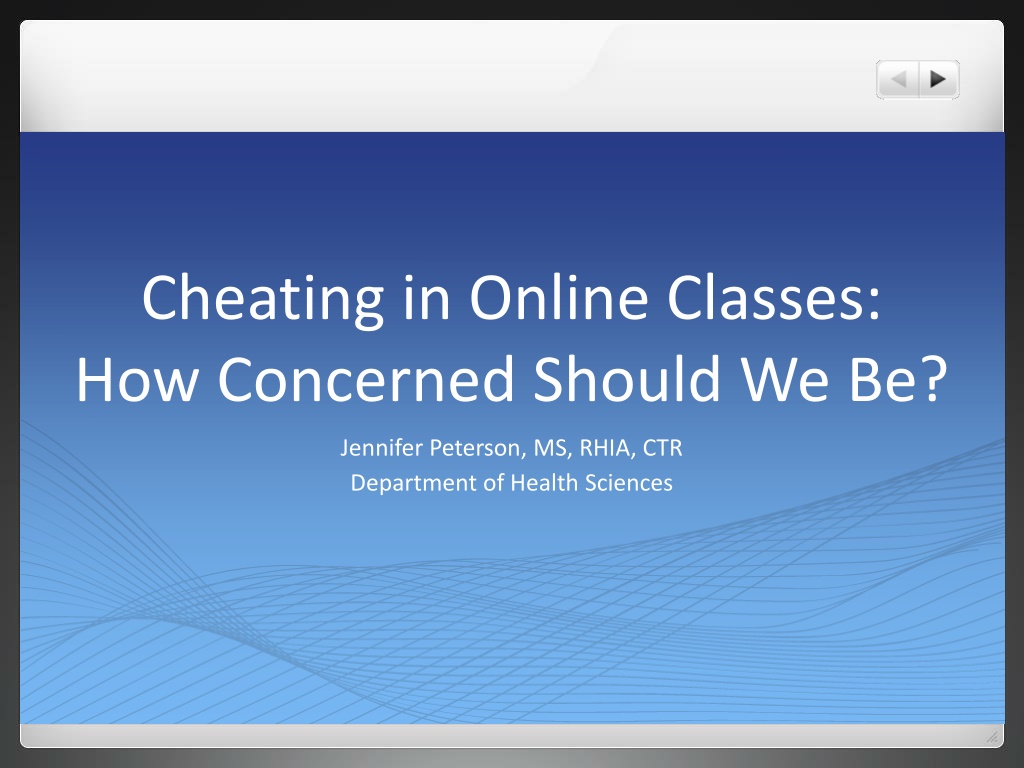

![❤Book⚡[PDF]✔ Fool Me Once: Should I Take Back My Cheating Husband?](/thumb/20473/book-pdf-fool-me-once-should-i-take-back-my-cheating-husband.jpg)
